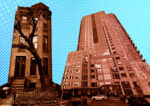Buyers just aren’t flocking to Brooklyn like they used to.
Home sales in the borough fell by nearly a third last quarter compared to the same point a year ago, despite mortgage rates staying more or less the same, according to market reports by Serhant and Brown Harris Stevens.
“When you stop seeing deals happen it has a very negative ripple effect,” said Coldwell Banker Warburg’s Gerard Splendore. “The momentum, for whatever reason, has just stalled.”
Agents noted that despite the slowdown, prices haven’t fallen, because of a lack of for-sale inventory, unmotivated buyers and unrealistic sellers. Serhant found the third-quarter median sale price in the borough rose nearly 8 percent from a year earlier, though BHS reported a slight decline in co-op closing prices. Co-ops have been out of favor with buyers.
Brooklyn’s market was buoyed during the pandemic as Manhattanites fled for more square footage and outdoor space, and to avoid the shared elevator rides that come with life in a high-rise. No longer.
“That’s over,” said Compass agent Raquel Lomonico. “It’s so over and done.”
Lomonico has noticed a natural progression of the trend — though on a smaller scale — that’s now pushing residents out of Brooklyn. For the first time, she has buyers interested in moving to Maspeth, Queens, in addition to the more traditional option of Ridgewood.
“Back in the day, people just wanted to live in Brooklyn,” she said. “Now they say Queens isn’t so bad.”
Buyers can get an entire house in Maspeth for $950,000 and still feel close to prime Brooklyn neighborhoods, she said.
Splendore said where he’s based in Bay Ridge, sellers still haven’t accepted what buyers now consider the value of their homes.
“They’ve been here for 25 years, they think the property is great and they’re entitled to a very high price,” he said.
He’s encouraged sellers to give buyers concessions, like paying for the first year of maintenance.
“You have to be clever and you have to be reasonable and you have to be negotiable,” he said. “You really have to be willing to compromise.”
Splendore and Lomonico are both pessimistic about the borough’s market this fall, pointing to mortgage rates, which have been flirting with 8 percent. Splendore pointed to next year’s presidential election — which creates uncertainty that deters buyers — and Lomonico to a final expected interest rate hike as evidence for their prognostications of a soft market.
“I had super high hopes for the fall,” said Lomonico. “I think we had a better summer than we’re going to have a fall.”
Read more



